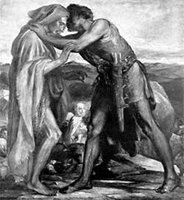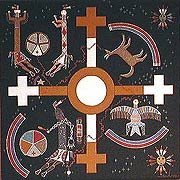 OK, Connor requested a class update, so here it is.
OK, Connor requested a class update, so here it is.We've spent the last three weeks talking about Genesis 1-3, and what it may or may not have to do with gender roles. I mean, we still haven't taken the five minutes we would need to define the terms "sex" and "gender", and consequently, people frequently say interesting things like, "Yes, I think Adam and Eve probably had sex ... um ... gender."
But moving on...
Like I said before, the class is tag-team-taught by Shane and another guy (Damon). After being in the class for several weeks, I can say that they've done a pretty good job of picking a direction and sticking with it. If I've understood their approach correctly, they're basically trying do apologetics for the creation narratives.
Shane has a sort of literary approach to the text, where you classify its genre and then you only listen to the messages you would expect to hear coming out of that genre. Damon has a sort of Rabbinical approach to the text, which means you try to tease out a lot of allegory and hidden meaning. But basically, both of them are doing a lot of work trying to get the students to interpret Genesis in a new way, and then, kind of parenthetically, following that up by arguing that Genesis talks about identity but not so much about gender roles.
I think this approach is pretty good. It makes the class of mostly college students stretch a little bit, and tweak their hermeneutic, and even reconsider their gender biases, but it doesn't require them to do anything terribly scary or off-putting. All in all, I think the students are going to come out of this class with a better way of reading the first 3 chapters of Genesis, and a little more play in their ideas about gender.
But I do think the teachers are a little reluctant to address certain issues, including
- What modern psychology says about gender
- What feminists say about gender
- The church's sins against women
- Why homosexuality is a gender issue
Maybe we'll get to these as we go along. At any rate, I'm hoping that before we get out of Genesis, we at least look at Jacob and Esau.


